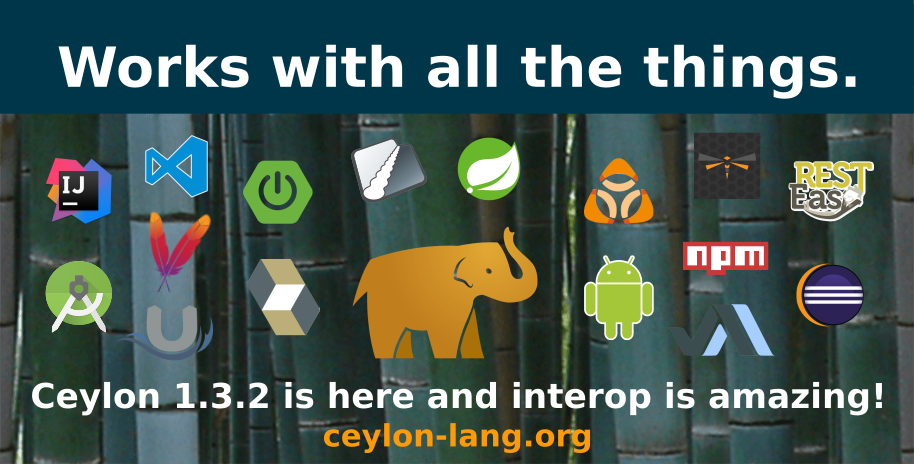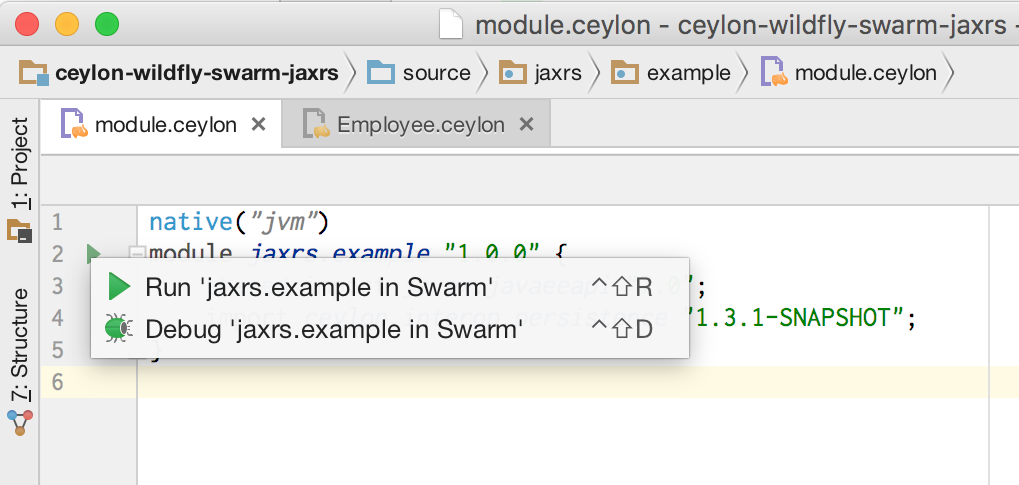Ceylon 1.3.2 is now available
Ceylon 1.3.2 is a significant minor release of the Ceylon language, with over 100 issues closed. This release introduces Ceylon assemblies, allows you to export Ceylon modules as Maven repositories, makes it even easier than before to have a mixed Java and Ceylon project in Maven, allows string interpolation in assertions, and introduces lazy initialization for attributes.
This release of Ceylon has been tested with a wide variety of Java libraries and frameworks, including:
- Spring Boot,
- WildFly and WildFly Swarm,
- Hibernate (JPA),
- RESTEasy (JAXB and JAX-RS),
- Weld (CDI) and Guice,
- Eclipse Equinox, Apache Karaf, and Apache Felix (OSGi),
- Spark,
- RxJava
- JOGL (OpenGL), and
- Android.
Example code demonstrating the use of these frameworks is available.
Changes
Enhancements to the language and command-line distribution include:
- Assemblies (
.casarchives) - Generate Maven repository
- Support for mixed Java and Ceylon module projects in Maven
- String interpolation in
assertmessages - Lazy initialization for attributes marked
late
The most notable issues representing those changes are:
-
#6712,
#6927,
#6929
assembly support —
ceylon assembleand.casarchives -
#6856,
#6847
ceylon maven-exportto assemble a Maven repo from list of Ceylon modules - #6872, #6853, #6875 syntax for specifying maven group/artifact ids and npm module names
-
#3692
string interpolation in
assertion failure messages - #3544 attribute lazy initialization
-
#6721
allow
lateattributes in declaration section -
#6804
much better return type for
Iterable.sequence() - #6797 named constructors to create Java arrays with streams of elements
-
#6784,
#6778
static methods for
Integer,Float, andString -
#2324
add annotations to
java.langfor Java modifiers -
#6735
add
--exclude-moduleoption toceylon copy
Naturally, the release incorporates many more bugfixes and minor enhancements.
IDE Changes
Ceylon IDE 1.3.2 for IntelliJ and
Eclipse resolves more than
60 issues, and adds several new features, including support
for running as a fat-jar and an improved formatter in IntelliJ.
SDK Changes
Exactly 6 issues affecting the Ceylon SDK have been fixed. New 1.3.2 releases of the platform modules are available in Herd.
Migration
For the JVM, this release is backwards-compatible with all previous releases of Ceylon since 1.2.0.
For JavaScript, this release is backwards-compatible only with the previous two releases (1.2.2 and 1.3.0).
Ceylon 1.3.2 is backward-compatible with Ceylon 1.3.0, and so it's not necessary to recompile or change dependencies. However, upgrading to version 1.3.2 of any Ceylon platform module is recommended.
About Ceylon
Ceylon is a modern, modular, statically typed programming language for the Java and JavaScript virtual machines. The language features a flexible and very readable syntax, a unique and uncommonly elegant static type system, a powerful module architecture, and excellent tooling, including an awesome IDE supporting both IntelliJ IDEA and the Eclipse platform.
Ceylon enables the development of cross-platform modules that execute portably in both virtual machine environments. Alternatively, a Ceylon module may target one or the other platform, in which case it may interoperate with native code written for that platform.
In the box
This release includes:
- a complete language specification that defines the syntax and semantics of Ceylon in language accessible to the professional developer,
- a command line toolset including compilers for Java and JavaScript, a documentation compiler, a test runner, a WAR archive packager, a "fat" JAR packager, and support for executing modular programs on the JVM and Node.js,
- a powerful module architecture for code organization, dependency management, and module isolation at runtime, which also supports interoperation with OSGi, Jigsaw, Maven, and npm, and
- the language module, our minimal, cross-platform, foundation-level API.
Available separately:
- updated versions of the platform modules that comprise the Ceylon SDK,
- a plugin for the
ceyloncommand that supports compilation and execution for the Dart VM, - a plugin packager for WildFly Swarm,
- a plugin code formatter,
- two full-featured integrated development environments: for Eclipse and IntelliJ IDEA, and
- a plugin for Visual Studio Code.
Language
Ceylon is a highly understandable object-oriented language with static typing. The language features:
- an emphasis upon readability and a strong bias toward omission or elimination of potentially-harmful or potentially-ambiguous constructs and toward highly disciplined use of static types,
- an extremely powerful and uncommonly elegant type system
combining subtype and parametric polymorphism with:
- first-class union and intersection types,
- both declaration-site and use-site variance, and
- the use of principal types for local type inference and flow-sensitive typing,
- a unique treatment of function and tuple types,
enabling powerful abstractions, along with the most
elegant approach to
nullof any modern language, - first-class constructs for defining modules and dependencies between modules,
- a very flexible syntax including comprehensions and support for expressing tree-like structures,
- fully-reified generic types, on both the JVM and JavaScript virtual machines, and a unique typesafe metamodel.
More information about these language features may be found in the feature list and quick introduction.
Community
The Ceylon community site, https://ceylon-lang.org, includes documentation, and information about getting involved.
You can follow @ceylonlang on Twitter.
Source code
The source code for Ceylon, its specification, and its website, is freely available from GitHub.
Information about Ceylon's open source licenses is available here.
Issues
Bugs and suggestions may be reported in GitHub's issue tracker.
Acknowledgement
As always, we're deeply grateful to the community volunteers who contributed a substantial part of the current Ceylon codebase, working in their own spare time. The following people have contributed to Ceylon:
Gavin King, Stéphane Épardaud, Tako Schotanus, Tom Bentley, David Festal, Enrique Zamudio, Bastien Jansen, Emmanuel Bernard, Aleš Justin, Tomáš Hradec, James Cobb, Ross Tate, Max Rydahl Andersen, Mladen Turk, Lucas Werkmeister, Roland Tepp, Diego Coronel, Matej Lazar, John Vasileff, Toby Crawley, Julien Viet, Loic Rouchon, Stephane Gallès, Ivo Kasiuk, Corbin Uselton, Paco Soberón, Michael Musgrove, Daniel Rochetti, Henning Burdack, Luke deGruchy, Rohit Mohan, Griffin DeJohn, Casey Dahlin, Gilles Duboscq, Tomasz Krakowiak, Alexander Altman, Alexander Zolotko, Alex Szczuczko, Andrés G. Aragoneses, Anh Nhan Nguyen, Brice Dutheil, Carlos Augusto Mar, Charles Gould, Chris Gregory, klinger, Martin Voelkle, Mr. Arkansas, Paŭlo Ebermann, Vorlent, Akber Choudhry, Renato Athaydes, Flavio Oliveri, Michael Brackx, Brent Douglas, Lukas Eder, Markus Rydh, Julien Ponge, Pete Muir, Nicolas Leroux, Brett Cannon, Geoffrey De Smet, Guillaume Lours, Gunnar Morling, Jeff Parsons, Jesse Sightler, Oleg Kulikov, Raimund Klein, Sergej Koščejev, Chris Marshall, Simon Thum, Maia Kozheva, Shelby, Aslak Knutsen, Fabien Meurisse, Sjur Bakka, Xavier Coulon, Ari Kast, Dan Allen, Deniz Türkoglu, F. Meurisse, Jean-Charles Roger, Johannes Lehmann, allentc, Nikolay Tsankov, Chris Horne, Gabriel Mirea, Georg Ragaller, Harald Wellmann, Oliver Gondža, Stephen Crawley, Byron Clark, Francisco Reverbel, Jonas Berlin, Luke Hutchison, Nikita Ostroumov, Santiago Rodriguez, Sean Flanigan, Schalk W. Cronjé.


